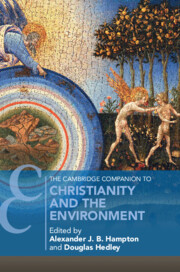Book contents
- The Cambridge Companion to Christianity and the Environment
- Cambridge Companions to Religion
- The Cambridge Companion to Christianity and the Environment
- Copyright page
- Contents
- Figures
- Contributors
- Preface
- 1 Introduction
- Part I Concepts
- Part II Histories
- Part III Engagements
- 14 The Sublime and Wonder
- 15 Religious Traditions and Ecological Knowledge
- 16 Venerating Earth
- 17 Nature and Aesthetics
- 18 Sophia and the World Soul
- 19 Creation and Gender
- Index
- Cambridge Companions to Religion
- References
15 - Religious Traditions and Ecological Knowledge
from Part III - Engagements
Published online by Cambridge University Press: 21 July 2022
- The Cambridge Companion to Christianity and the Environment
- Cambridge Companions to Religion
- The Cambridge Companion to Christianity and the Environment
- Copyright page
- Contents
- Figures
- Contributors
- Preface
- 1 Introduction
- Part I Concepts
- Part II Histories
- Part III Engagements
- 14 The Sublime and Wonder
- 15 Religious Traditions and Ecological Knowledge
- 16 Venerating Earth
- 17 Nature and Aesthetics
- 18 Sophia and the World Soul
- 19 Creation and Gender
- Index
- Cambridge Companions to Religion
- References
Summary
The oldest cave paintings yet discovered are in a cave in Sulawesi, Indonesia. The paintings depict other animals in symbolic forms as participant agents, alongside early humans. Such conceptions of co-agency endured throughout human history in indigenous religions, particularly culturally isolated groups dwelling in deserts, forests, islands, and mountains. This ‘original’ ontology was taken up from indigenous religions into world religious traditions first in the Vedas and then in ‘axial age’ traditions including those of classical Greece, Judaism and, under their influence, Christianity. However in Latin Christianity the cultural imaginary of participation in a shared realm of being declined in favour of a new religious narrative focused on human souls. The subsequent rise of Enlightenment rationalism and personalism conferred on modern humans a sense of control and dominance in their agency of Earthly habitats in which they have progressively sought to eradicate the agency, and diversity, of the other beings. In this chapter I outline the original participative ontology in indigenous and world religious traditions; I examine the reasons for and impacts of its decline; and I discuss ways in which it may be recovered.
- Type
- Chapter
- Information
- The Cambridge Companion to Christianity and the Environment , pp. 231 - 246Publisher: Cambridge University PressPrint publication year: 2022



